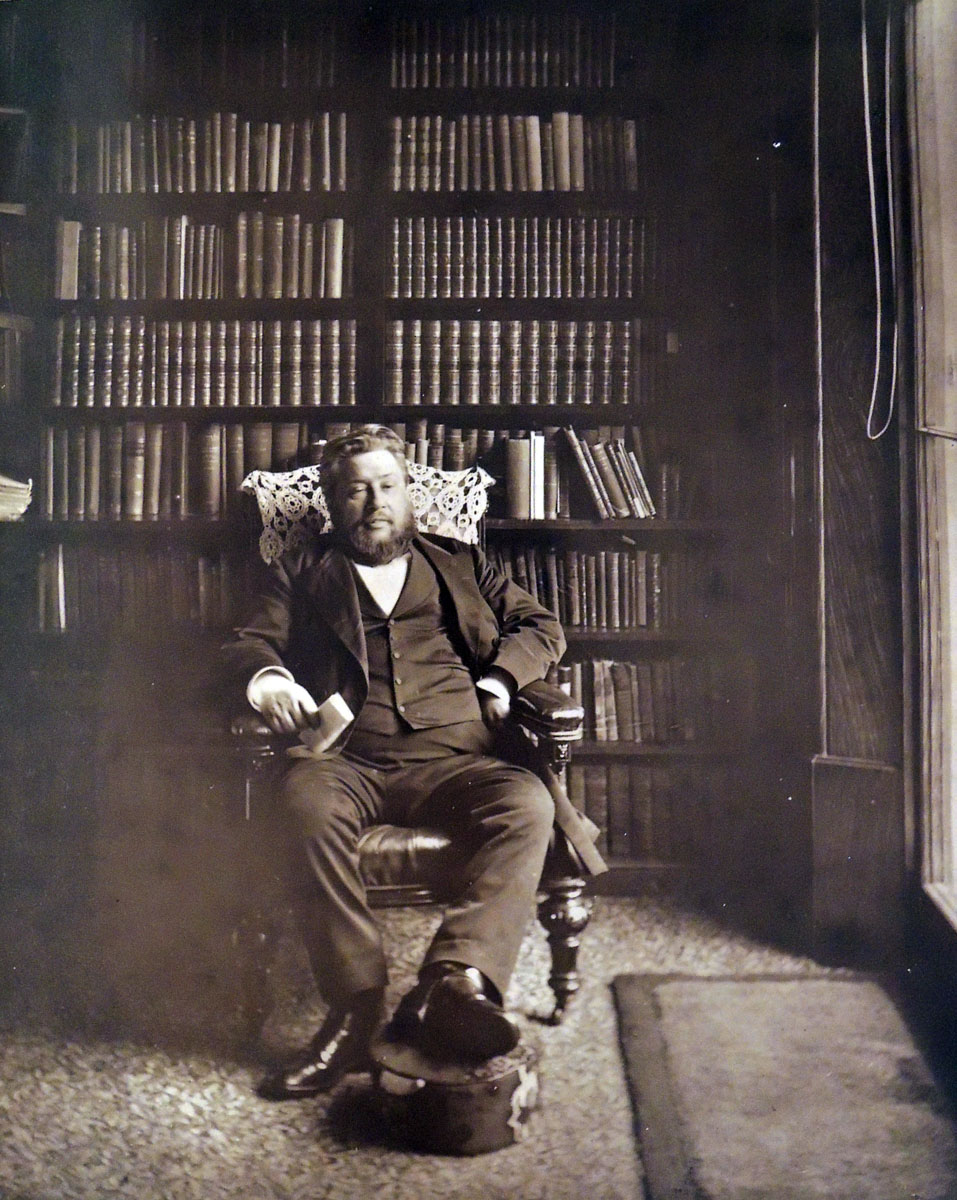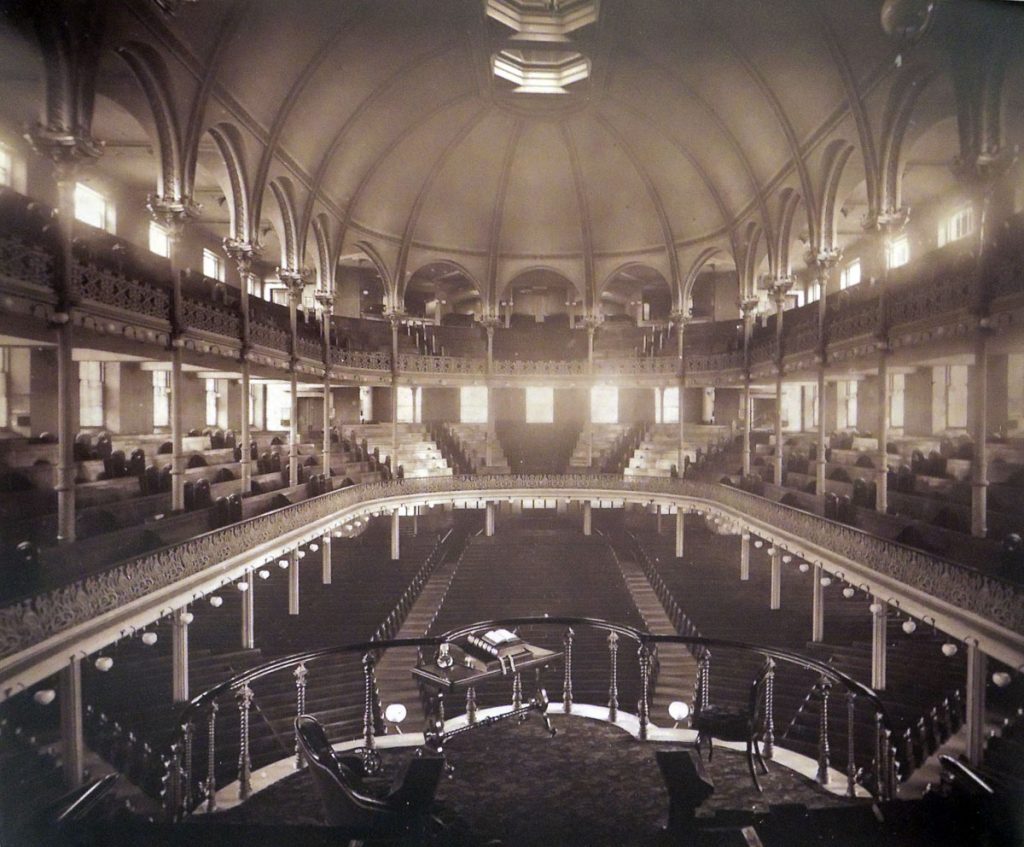History: December 2020 Archives
Recently I've returned to the habit of reading a book before bedtime and when eating on my own, leaving aside the digital device and focusing my attention on the printed page. In the past few weeks I've finished Calvin Coolidge's autobiography, Arnold Dallimore's biography of Charles Haddon Spurgeon, a short book collecting Spurgeon's controversial writings calling attention to theological liberalism among British Baptists and Congregationalists (known as the "Down-Grade Controversy"), and started into The Federalist Papers, with an introductory essay by Garry Wills.
 Charles Haddon Spurgeon in his study, 1882, age 48
Charles Haddon Spurgeon in his study, 1882, age 48Charles Haddon Spurgeon (1834-1892) might be considered the first of the megachurch pastors. A Baptist of Calvinist convictions, he was gifted with a prodigious memory, a quick verbal wit, and, most importantly, a godly heritage by way of his grandfather and father, both Independent (Congregational) ministers of the Puritan persuasion. He began at age 16 as preacher and pastor of a Baptist chapel in Waterbeach, Cambridgeshire, then was called to serve as pastor of the historic New Park Street Chapel in Southwark, in greater London, at age 20. His congregation quickly grew to thousands, overflowing the building, requiring a move first to Exeter Hall in the Strand while the church was being enlarged, then to the Surrey Gardens Music Hall, and ultimately to a new facility, the 6,000-seat Metropolitan Tabernacle near Elephant and Castle in Newington, now in the London Borough of Southwark. In addition to preaching twice on Sunday and on other occasions through the week, Spurgeon edited and wrote essays and book reviews for a monthly magazine, The Sword and Trowel, founded an orphanage, founded and taught at a pastor's college, and initiated many other missions and ministries under the auspices of the church.
 A view of the Metropolitan Tabernacle from the pulpit, 1882
A view of the Metropolitan Tabernacle from the pulpit, 1882During my time in the south of England two years ago, I worshipped on a few occasions at the Metropolitan Tabernacle, which is still faithfully proclaiming the same gospel that Spurgeon preached in the same straightforward and unadorned way. Although the auditorium is much smaller than in Spurgeon's time -- it took a direct hit during the Blitz and was rebuilt after the war; the Greek Revival portico survived the attack -- every seat was filled, and the congregation was diverse in ethnic background and age. There seemed to be far more non-English faces than English faces in the congregation. No fog machines or colored lights. After a few hymns accompanied by organ, the congregation heard an expository sermon from Dr. Peter Masters or one of his associates. Masters marked his golden anniversary as senior pastor this November.
My curiosity about Spurgeon was rekindled by an item recently posted to social media summarizing his busy but productive weekly schedule, a summary of this passage in Volume 2 of the Autobiography. I pulled Arnold Dallimore's 1985 concise biography of Spurgeon off of the shelf and got through it in a few days, which only whetted my appetite to read more of his own work and to learn more of his life and times. As Spurgeon's opus is entirely in the public domain, there is a wealth of his work available online.
Spurgeon is very accessible to modern readers. Although there will be unfamiliar cultural references, and there have been shifts in meaning for some words, these are not barriers. Spurgeon writes with a warmth and wit that reaches the reader even when difficult subjects are in view.
Major repositories of Spurgeon's work:
Spurgeon's Morning and Evening: His daily devotional, presented in blog form.
The Spurgeon Archive: A selection of Spurgeon sermons and essays and essays about Spurgeon, curated by Phil Johnson, associate pastor of Grace Community Church in Los Angeles. There is a large collection of interesting items from Spurgeon's writing in The Sword and the Trowel, many of them reflecting Spurgeon's sense of humor.
- Spurgeon's account of an 1867 visit to Heligoland (then a British possession off the coast of Germany): Johnson calls "surely the best and funniest of Mr. Spurgeon's travelogues."
- A chapter of the Autobiography devoted to fun
- A caricature and sketch of Spurgeon from Vanity Fair
- Spurgeon's frustration with requests from aspiring blank-verse poets to read and find publishers for their work
- Free advice, including Spurgeon's opinion on the proper length of a sermon
- Spurgeon's love of fine cigars, which he "smoked to the glory of God"
Reformed Reader: Spurgeon collection, which includes his monumental multi-volume commentary on the Psalms, The Treasury of David, arranged for web navigation, and The Down-Grade Controversy: All of the essays, notes, and excerpts from The Sword and the Trowel, the Metropolitan Tabernacle Pulpit, and the Autobiography that are contained in Pilgrim Publications' little book of the same title.
The Spurgeon Center for Biblical Preaching at Midwestern Baptist Theological Seminary: The seminary is home to Spurgeon's personal 6,000 book library (formerly at William Jewell College, acquired for $3,000 in 1905), which is being digitized along with his annotations.
Spurgeon Gems: All 3,563 of Spurgeon's published sermons, with audio recreations of many sermons, books in PDF and plain text format, a collection of prayers by Spurgeon, notable quotes, and materials in Spanish.
Internet Archive collection of works by or about Spurgeon
Spurgeon in print:
Pilgrim Publications, Pasadena, Texas, which reprints facsimile versions of all of Spurgeon's works.
Banner of Truth Trust publishes modern editions and anthologies of Spurgeon's writing, including the Autobiography, a collection of letters, edited with commentary from Iain Murray, and Dallimore's biography.
Susie, The Life and Legacy of Susannah Spurgeon, is due out from Moody Press early next year (2021).
Contemporary biographies of Spurgeon in the public domain:
Shortly after Spurgeon's death, his wife Susannah and his private secretary, J. W. Harrald, assembled a four-volume Autobiography from his diaries, sermons, letters, and notes:
Volume 1, 1834-1854 Reformed Reader: Descriptions of life at Westwood from Susannah Spurgeon's book fund reports from Russell H. Conwell's Life of Charles Haddon Spurgeon, The World's Great Preacher. Other items of interest:
Volume 2, 1854-1860
Volume 3, 1860-1878
Volume 4, 1878-1892